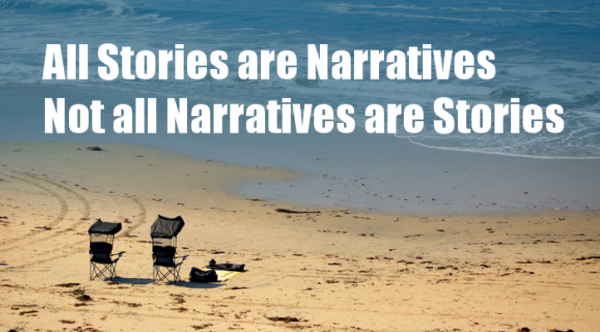
“So, I’m standing behind this odd little man at Starbucks,” your friend says.
“Yeah?” you ask, anticipating a good story.
“He goes to the counter and orders a ‘Cup-o-Joe, for Joe, to go,’” she says, complete with air quotes. “Isn’t that funny?”
“Yeah,” you fib.
She continues. “Then, I trip while walking to my car.”
“Oh, no! Did you get hurt?” you ask.
“No,” she says. “But I almost spilled my coffee. Then, I get into my car and notice that I’m almost out of gas.”
We’ve all been in situations like this before. We’re listening to a friend tell a story, but our attention wanes and we wonder, Where is this story going? Why is she telling me this? Will all of these facts (odd little man, tripping in the parking lot, and running out of gas) come together somehow?
“Luckily,” she continues, “I got to the gas station just as the warning light came on.”
And there it is. The answer is no.
So what’s happening? Why is this story an epic fail? Why do you feel like gouging your eye with a rusty fork?
It’s because you aren’t listening to a story. It’s a narrative. And while many people use the words interchangeably, they are different.
A narrative is a collection of facts, like odd little men, coffee spills, or almost running out of gas. A story is the result of people pursuing what they want, followed by the difficulties experienced during their quest. Bestselling author, Robert McKee explains, “All stories are narratives. But, not all narratives are stories.”
Your friend’s narrative could have become a story had it contained some different things. For example:
- if the odd little man had forgotten his wallet and she paid for his coffee.
- if she spilled her coffee on her expensive new shoes while on the way to an important client who always compliments her shoes.
- if she combined all three facts, such as running out of gas and then being helped by the odd little man who pulled up in his shoe-shine truck.
Most marketers are great at telling narratives because they’re experts in stringing together facts, feeds, speeds, features, and benefits. Rarely are these narratives considered stories, however, because those facts are never put into the context of people pursuing what they want.
The next time you write a piece of marketing material, ask yourself, “Is this a narrative or a story?”